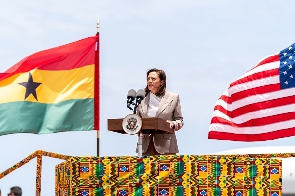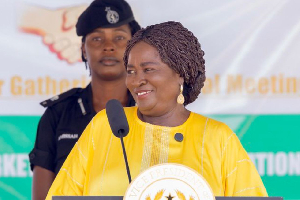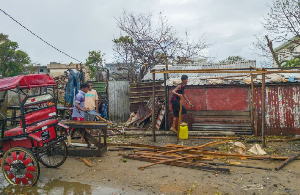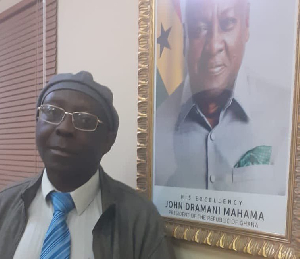Few days after Ghana’s Finance Minister announced on his tweeter handle some positive news about the country’s ongoing external debt treatment negotiations with China in Beijing, Kamala Harris, the Vice President of the free world touched foot in Ghana for a weeklong visit to Africa intended to deepen U.S. relationships amid global competition over the continent’s future.
Her opening words to the people of Africa signaled a ‘born-again’ United States of America that is now willing to walk the talk of seeing Africans as co-equals in the world economic order, “In particular on this trip, I intend to do work that will increase investment on this continent,” she said.
It is clear that the US is considering a diplomatic option, an impulse capable of transforming its relationship with Africa, so that her schedules, structures, energies and programs can be suitably channeled for the advancement of a mutual symbiosis, rather than for her self-preservation and unwarranted accusation of the East of foul play.
A self-preservation trapped in the commingling of white supremacy with western imperialistic and colonial mentality. An arrogance of power which Arikana Chinombori-Quao, an AU envoy in US attribute to “disrespect for Africans.”
However understandable the US and its allies’ concerns and suspicions about political influence, military advantage, strategic access and the presence of Eastern powers on the African continent are, Africa has fallen in love with China; and it is not a romantic affair that can be exorcised by prejudicial hate or political rivalry.
post-modern African is not in dying need of foreign aid, Christian proselytism or export of its human and mineral resources. The new Africa is not a place wrapped up by over-emphasized 20th century civil wars, diseases, extreme poverty and indebtedness in need of a western savior.
The 21st century Africa is looking for partners and friends who wish to work for the advancement of the happiness, quality of life, justice, progress and peace of its youthful population. Africa needs development partners to augment her efforts in achieving the SDGs not just to get a seat at the G20, UN Security Council and other multilateral fora, but for the black race to be respected everywhere they go.
US government Officials’ constant description of China’s presence in Africa as predatory; that African leaders are being tricked or bamboozled into some form of entrapment by the Chinese government feeds unfortunately into the infuriating eugenic narrative that Africans are an inferior race who do not know what they want and need to be told what to do.
US has accused China of a zero-sum “debt trap diplomacy” in which China wins and Africa loses. Alas, as at 2022, only 12% of Africa’s private and public external debt comes from China; meaning the huge chunk of Africa’s debt (with relatively higher interest rates) comes from Europe and the Americas.
Meanwhile, China took part in the G20’s debt-suspension scheme during Covid, western private creditors (who account for 35% of Africa’s debt) did not. No country has cancelled debt owed it by its foreign debtors more than China. So, between East and West, who is trapping Africa with debt?
At the dawn of the 21st century when Africa was convulsed with debts, insecurity and a dependency syndrome, and most western countries did not find the continent attractive enough for business, risk-loving China saw an opportunity to invest in Africa, seeking resources through short supply chains to feed her local industries while paying with infrastructure loan deals.
With its huge deficit in physical infrastructure, and the West declining to finance its capital infrastructure, African countries found the China model more attractive to the London Stock Exchange Market model of the West. The West declined to build the 1,860km Tazara railway system from Tanzania to Zambia; but China agreed to do it.
In the last two decades, China has built more roads, hospitals, digital infrastructure, railways, etc. at relatively cheaper cost to the African tax payer than those built by European companies at same quality.
About 63% of Africans think that Africa-China relations is positive. And whereas China has FOCAC conference that seeks to advance Africa-China cooperation in politics, economics, cultural, international affairs and social development, no such biennial forum exists between a Western country and Africa, except for nine-day-wonder bilateral pep talks such as the US-Africa leaders’ Summit whose agenda is always predetermined solely by the west.
In conclusion, it is refreshing to hear the Vice President of the US announce her country’s newly found commitment to invest in Africa. It seems China’s penetration in the African market has engendered a jealousy that is capable of turning the ongoing soft power struggle between East and West further in Africa’s favor.
Of course, the US National Defense Strategy 2018 describes China as a strategic competitor, hence Africa does not expect a flowery language from the US about China-Africa relations.
Nevertheless, the faster America identifies the immense opportunities that China saw in Africa two decades ago, rather than being a place for counter-terrorism, military base for special forces and a dying continent in need of saving, the better for them.
Their rivals have updated their cognitive biases about Africa and are today ripping the fruit therein; it is not too late for US and the West to join themselves to the proverbial African boat by sowing seeds for the future…Fruits that will nourish all peoples on this blue planet called Earth.
Opinions of Monday, 27 March 2023
Columnist: Godfred W. Michaldo Atanga















